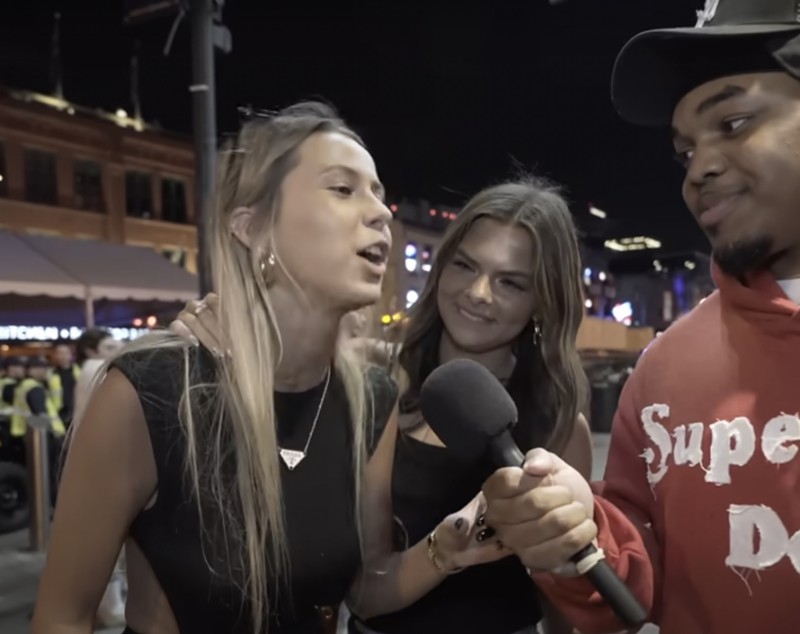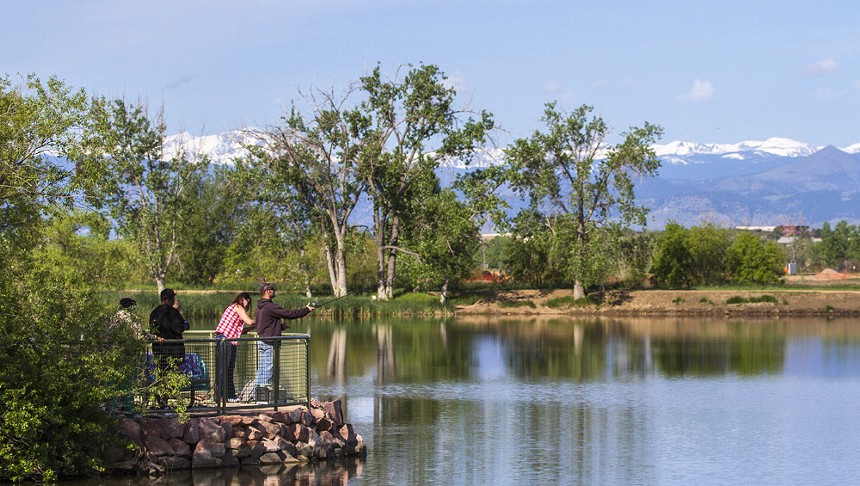St. Vrain State Park in Firestone is described as a "family-friendly destination" for visitors seeking a "peaceful and simple outdoor break" from life — and, more specifically, as a great place for anglers — by Colorado Parks & Wildlife.
"Trout fishing is excellent from fall through spring," the CPW website says, noting how there are nearly 230 acres of water, including Bald Eagle Pond and Great Blue Heron Reservoir, two trophy bass ponds.
"Bald Eagle is artificial fly and lure only, no bait of any kind is permitted," the website adds.
Over on Facebook, St. Vrain Park Ranger Scott Reffel is taking a different approach toward reminding visitors of rules and regulations.
"One of the reasons many trophy fisheries around the state, such as Bald Eagle Pond, prohibit the use of bait is that if a fish, such as a largemouth bass, bites onto bait, they often taste that it is authentic food and swallow it, lodging the hook deeper in the mouth, throat, or even gill; whereas if they taste it is something inedible such as wood or plastic, they will go *hawk tuah* and spit out that thang," Reffel wrote in a June 21 post that currently has almost 6,000 likes.
For those living under a social media rock, "hawk tuah" is a saying that went viral last month after a girl uttered it during an interview on the streets of Nashville while describing her "one move in bed that makes a man go crazy every time."
“You gotta give ’em that ‘hawk tuah’ and spit on that thang!” she declares proudly.
The interview, done by Tim & Dee TV on YouTube, has sparked countless internet posts, sports celebrations and even "Hawk Tuah" merch, and the woman who said the phrase, Hailey Welch, is making the rounds on popular podcasts and interview shows as the "Hawk Tuah Girl."
Reffel saw the phrase being used on a police, fire and EMS page to describe spit-shining one's duty boots when polishing them, and couldn't resist.
"I thought that was a funny way of using it without it being raunchy," he tells Westword of his recent baiting advice.
For the past two and a half years now, Reffel and other CPW rangers across the state have been using social media to run an "edu-tainment focused" parks campaign that's aimed at being educational, entertaining, "authentic" and informational, he says. Memes and internet crazes like "hawk tuah" are used intentionally to get more eyes on CPW facilities and parks, especially ones that don't bring in as many visitors or aren't as popular.
"Our park is not particularly well known, even in the area, so we use [social media] for outreach, education, and for promotion," Reffel explains. "When I took over our page in 2014, we had a three-star review on most platforms; now we're at a 4.2. That's also due to our staffing and the quality of our resources, but that's because people are liking and following the page and leaving more positive reviews."
Brittni Ehrhart-Gemmill, CPW's digital marketing and social media strategist, set the agency's social media campaign in motion two and a half years ago with the hope of establishing a "style and tone" that both park-goers and random people could embrace and relate to as a community. Her main goal is to "use social media to be social," posting content that "takes risks to build engagement and start conversations" in an "incredibly valuable way," she says.
"Our St. Vrain State Park’s post by our park ranger Scott is a great example of putting this into action," Ehrhart-Gemmill adds. "We also want to stay top of mind on social media platforms, so we utilize trends to stay relevant and to create opportunities for education while being entertaining. Our team works to test content, to learn what works for what platform and to build rapport with our audience."
The way it works is simple, according to Ehrhart-Gemmill. Funny posts or memes create a "digital pathway" for families to connect with the outdoors.
If something silly like the "hawk tuah" post or one of CPW's recent life jacket “Colorado Pairings” safety descriptions grabs the attention of a mom who then explores a state park Facebook page and finds a free fishing clinic being held the next day, she now has an opportunity for her kids that she may have never known existed.
"The more people we create digital pathways for so that they can explore, discover and enjoy our Colorado outdoors, the more impactful a 'silly' post can be," Ehrhart-Gemmill says. "This digital pathway to the outdoors holds space for us to continue to create many more silly posts, and to continue to engage on this level."
According to Reffel, not every review or interaction with attempts to mix in memes or viral content is positive, but most are.
"A couple people have tried to correct us about our own regulations or the spirit behind them, which is humorous on its own," he says. "Only one person in the comments said they disagreed with [the 'hawk tuah'] use, while many more applauded it. A few said I should get promoted! Other rangers who manage other parks pages told me they loved it."
There are some risks to spicier forms of edutainment, but Reffel says that St. Vrain rangers use negative reactions and reviews to adjust. Overall, he feels that more engaging social media content will bring visitors back or simply keep them in the loop for future outings.
"This was a platform to stay in touch and informed and reminded of this little gem just off the interstate," Reffel says. "I usually post something educational or regulatory, but with a pretty picture or funny animal from a trail camera — to get a non-political, non-divisive message out to people that their parks and wildlife are still out here and they are to be enjoyed, so they should stop doomscrolling and get outside."
While Colorado has helped lead the way in recent years, it's not just the Centennial State or state parks where rangers are reaping the benefits of social media.
A 2024 study published in the Proceedings of the National Academy of Sciences found that national parks across the country with "high" social media exposure see increases in visitation of 16 to 22 percent compared to parks with less exposure.
"Social media posts with media attachments and positive sentiment garner larger visitation effects," the study says. "These findings can aid the National Park Service in understanding the drivers of recreation decisions as they struggle with concerns about deferred maintenance costs and implement strategies to manage the increased demand for parks."
Visitation to national parks has increased by more than 25 percent over the past decade and a half, skyrocketing from roughly seventy million annual visitors in 2010 to ninety million today, according to the study. Anecdotes provided for National Academy of Sciences research suggest that this increase was driven by "the advent of social media in the early-to-mid 2010s, generating a new form of exposure for parks."
Ehrhart-Gemmill calls it "showing the human side" of things, which in Colorado has helped build approachability and trust — and CPW's social media reach. Even if "sometimes the content performs exceedingly well and sometimes it doesn’t, CPW has gained over 110,000 followers on social media over the last two and a half years, according to Ehrhart-Gemmill.
"We want our social media audiences, state parks users, anglers, hunters, hikers, bikers, boaters, etc., to reach out to us and to engage with us, because we’re here for them," she says. "We know safety messages aren’t sexy in any regard, but we’ve been rolling out a wide array of content to grab our social media users' attention. ... What matters is that we continue to experiment so that we can continue to reach more people!"
[
{
"name": "Air - MediumRectangle - Inline Content - Mobile Display Size",
"component": "12017618",
"insertPoint": "2",
"requiredCountToDisplay": "2"
},{
"name": "Editor Picks",
"component": "17242653",
"insertPoint": "4",
"requiredCountToDisplay": "1"
},{
"name": "Inline Links",
"component": "18838239",
"insertPoint": "8th",
"startingPoint": 8,
"requiredCountToDisplay": "7",
"maxInsertions": 25
},{
"name": "Air - MediumRectangle - Combo - Inline Content",
"component": "17261320",
"insertPoint": "8th",
"startingPoint": 8,
"requiredCountToDisplay": "7",
"maxInsertions": 25
},{
"name": "Inline Links",
"component": "18838239",
"insertPoint": "8th",
"startingPoint": 12,
"requiredCountToDisplay": "11",
"maxInsertions": 25
},{
"name": "Air - Leaderboard Tower - Combo - Inline Content",
"component": "17261321",
"insertPoint": "8th",
"startingPoint": 12,
"requiredCountToDisplay": "11",
"maxInsertions": 25
}
]













